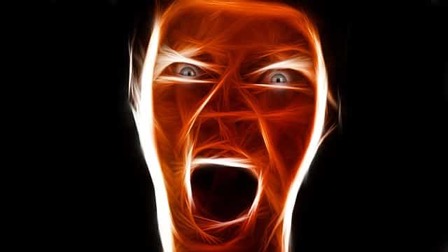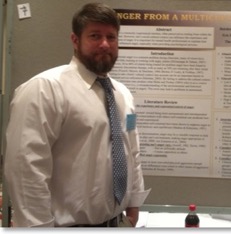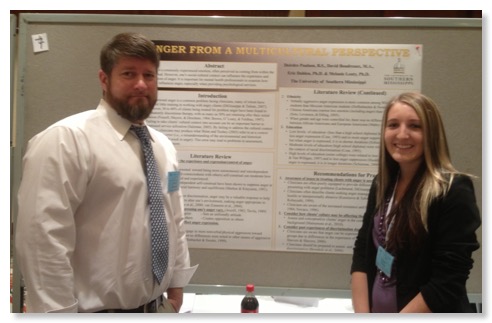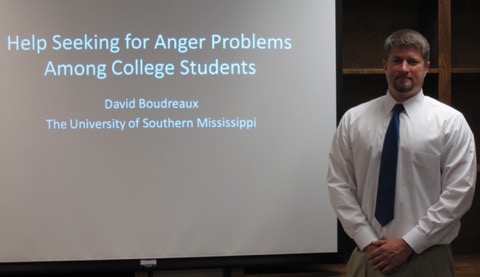
Director: Eric R. Dahlen, Ph.D.
Alison Poor Proposes Dissertation
09/23/21
Alison Poor, an advanced doctoral student working in the Anger and Traffic Psychology Lab at the University of Southern Mississippi, successfully proposed her dissertation this week. Ali’s dissertation aims to learn more about relational aggression and victimization among adult women through the lens of social information processing theory (Crick & Dodge, 1994). Her planned use of an MTurk sample will allow her to test a theoretically derived model across three developmental periods.
Ali’s dissertation builds on her thesis work, which highlighted the role of anger rumination in relational aggression. She is adding a number of other variables that will allow her to test some proposed mediation and moderation relationships in one model, but we are most excited about her plans to conduct invariance testing across age groups. There has been relatively little research on relational aggression among adults, and we should learn more from Ali’s study.
Congratulations to Ali on her successful proposal!
Ali’s dissertation builds on her thesis work, which highlighted the role of anger rumination in relational aggression. She is adding a number of other variables that will allow her to test some proposed mediation and moderation relationships in one model, but we are most excited about her plans to conduct invariance testing across age groups. There has been relatively little research on relational aggression among adults, and we should learn more from Ali’s study.
Congratulations to Ali on her successful proposal!
Ali and Savannah Present Posters at Virtual MPA Convention
10/13/20

Congratulations to Savannah and Ali for disseminating their findings!
Merold, S., Dahlen, E. R., Madson, M. B., & Nicholson, B. C. (2020, September 24-October 9). Psychopathic traits as a moderator of the relationship between social intelligence and relational aggression [Poster session]. 71st Annual Convention of the Mississippi Psychological Association, Bay St. Louis, MS, United States.
Poor, A., Dahlen, E. R., Leuty, M. E., & Nicholson, B. C. (2020, September 24-October 9). Relational aggression and trait anger: The mediating role of anger rumination [Poster session]. 71st Annual Convention of the Mississippi Psychological Association, Bay St. Louis, MS, United States.
Alison Poor Defends Thesis
04/24/20

Ali examined two research questions separately due to the expected overlap between some of her variables and differences in the theoretical rationale for the models she tested. First, she found that anger rumination mediated the relationship between trait anger and relational aggression. Second, she found that vengeance did not mediate the relationship between relational victimization and relational aggression, although both relational victimization and vengeance predicted relational aggression.
Due to the COVID-19 pandemic, Ali's thesis defense was conducted online through Microsoft Teams. Fortunately, everything worked well and the online format was not an issue.
Congratulations to Ali on a successful thesis defense!
Taylor Bolton Defends Dissertation
10/23/19

After completing the revisions requested by her committee, Taylor plans to re-examine some of her analyses as we work on streamlining her study for publication. By eliminating some of the variables that contributed little and adding at least one covariate, we hope to end up with a more parsimonious model that will be helpful in understanding cyber aggression.
Congratulations to Taylor on the successful defense of her dissertation!
Taylor is in the process of applying for predoctoral internships next year. Defending her dissertation early will give her more time to focus on the internship experience.
What is Anger?
09/26/18

At the physiological level, anger involves arousal of the autonomic nervous system. This is typically experienced as a rush of adrenaline, muscle tension, increased heart rate, and other sensations which are part of how our bodies prepare us for action. Some people experience this sort of physiological arousal more intensely than others, and some experience it over a longer period of time than others. This combination of intense and long-lasting arousal can be a risk factor for a number of health problems.
Cognitively, anger often involves the perception of some sort of threat to ourselves, our property, our self-image, or other areas with which we identify. During an angry episode, we are likely to perceive even neutral events as being intentional, unfair, and undeserved. Not surprisingly, this usually has the effect of making us angrier. It turns out that how we think about events in our environment is very important to why we become angry initially and how our anger is maintained over time.
The behavioral component of anger includes the manner in which it is communicated. Some people tend to suppress their anger, holding it inside until they feel like they are going to boil over. This is sometimes described as an “anger-in” style of anger expression. Others express their anger outwardly in uncontrolled displays of yelling, slamming doors, threatening others, or even aggressive behavior (i.e., an “anger-out” approach to anger expression). Both of these anger expression styles can lead to problems, and both can be contrasted with healthy anger control.
At the Anger and Traffic Psychology Lab, we are interested in trait anger (i.e., one’s general propensity to experience angry feelings), anger expression and control, and a number of closely-related topics (e.g., anger rumination, hostility, emotion regulation, aggression). At mild to moderate levels, anger can have a number of beneficial effects; however, anger that is excessive, chronic, or associated with maladaptive behaviors can lead to a number of problems and deserves attention.
Skylar Hicks Defends Thesis
02/24/18

She found that trait anger and difficulties in emotion regulation were positively related to peer relational aggression. That is, students with a higher propensity to experience angry feelings and difficulties regulating their emotions were more likely to report engaging in relationally aggressive behavior in their peer relationships. Contrary to what was expected, difficulties in emotion regulation did not moderate the relationship between trait anger and relational aggression. We will likely conduct additional analyses to determine why this might be the case and how best to incorporate emotion regulation in future studies.
Five Tips For Managing Anger While Driving
07/16/17
We have all experienced feelings of anger toward others while driving. These range from mild annoyance or frustration to intense rage. For some, it is the vehicle in the left lane driving slower than the posted speed limit. For others, it is the reckless driver weaving in and out of traffic. It is in these moments that we may become tempted to do something stupid, something that could place us in danger.
Here are five tips for staying safe in anger-provoking driving situations:
Here are five tips for staying safe in anger-provoking driving situations:
- Don't take it personally. It often seems like other drivers must be deliberately messing with you, but this is rarely the case. The "rude" driver who veered into your lane probably did not see you. The person merging onto the freeway slowly enough that you had to brake wasn't waiting for you on the on-ramp just to ruin your day. Others' bad driving is rarely aimed at you.
- Avoid name-calling. Even if you manage to refrain from yelling out your window at other drivers, research suggests that calling them inflammatory names (even just to yourself) makes you more angry rather than less angry.
- Let go of the need to be right. Your safety is more important than being right. Maybe you were the first to arrive at the 4-way stop and you have the right-of-way. If the other vehicle blasts through the intersection anyway, the fact that it was your turn will not be much consolation when it hits you.
- Recognize that if someone else is determined to have an accident, you don't need to be part of it. Sometimes, the best thing you can do is to slow down and let the other driver pass you. Maybe the other driver is intoxicated or playing with his or her smartphone. These are drivers you do not want to be close to. If they have an accident, it is better that it does not involve you.
- Remember that it is not your job to punish other drivers. We have all had the urge to honk, slow down in front of someone tailgating us, cut in front of another driver, or make obscene gestures to "teach them a lesson." This sort of retaliation may feel good, but it increases the likelihood that you could end up the target of someone else's road rage.
David Boudreaux Defends Dissertation on New Measure of Attitudes Toward Anger Management
08/25/15

It is hoped that this measure will ultimately provide clinicians will a tool for assessing client perceptions of anger management. Now that we know something about how the measure works with college students, the next phase of development will likely involve data collection in non-college and clinical samples.
David recently started his predoctoral internship at the James A. Haley Veterans Hospital in Tampa, FL. He had very positive things to say about his experience so far and recommended this site to future students interested in VA internships.
Congratulations, David!
Emily Prather Defends Dissertation on Anger and Binge Eating
04/16/15
Emily Prather successfully defended her doctoral dissertation yesterday at the University of Southern Mississippi, Predictors of Binge Eating in College Women. Emily's study evaluated the relationships among four theoretically relevant factors hypothesized to predict subclinical binge eating in a sample of college women: trait anger, anger suppression, impulsivity, and emotion regulation.
Emily started by confirming the four-factor structure of the UPPS Impulsivity Scale (Whiteside & Lynam, 2001) through confirmatory factor analysis. Multiple measures of impulsivity have been used in the literature, and the UPPS is one of the newer ones. Given that there has been some disagreement over the optimal factor structure, it was important to make sure that the four-factor structure of this measure would be confirmed in this sample. After confirming this factor structure, Emily found that the urgency and lack of perseverance factors predicted binge eating. Urgency was a hypothesized predictor, but the utility of perseverance was unexpected and suggests that the role of impulsivity in binge eating may be somewhat broader than previously thought.
Trait anger predicted binge eating over and above general negative affect, suggesting that there seems to be something about one's propensity to experience angry feelings that may be particularly useful in understanding binge eating. The tendency to suppress anger in an unhealthy manner also predicted binge eating, and both anger suppression and emotion regulation partially mediated the relationship between trait anger and binge eating. It appears that anger management and the development of emotion regulation strategies may be worth exploring for college women with subclinical binge eating.
Emily is currently completing her predoctoral internship at Wellspan Behavioral Health in York, PA. She recently accepted a postdoc position with Wellspan to begin this summer.
Congratulations, Emily!
Emily started by confirming the four-factor structure of the UPPS Impulsivity Scale (Whiteside & Lynam, 2001) through confirmatory factor analysis. Multiple measures of impulsivity have been used in the literature, and the UPPS is one of the newer ones. Given that there has been some disagreement over the optimal factor structure, it was important to make sure that the four-factor structure of this measure would be confirmed in this sample. After confirming this factor structure, Emily found that the urgency and lack of perseverance factors predicted binge eating. Urgency was a hypothesized predictor, but the utility of perseverance was unexpected and suggests that the role of impulsivity in binge eating may be somewhat broader than previously thought.
Trait anger predicted binge eating over and above general negative affect, suggesting that there seems to be something about one's propensity to experience angry feelings that may be particularly useful in understanding binge eating. The tendency to suppress anger in an unhealthy manner also predicted binge eating, and both anger suppression and emotion regulation partially mediated the relationship between trait anger and binge eating. It appears that anger management and the development of emotion regulation strategies may be worth exploring for college women with subclinical binge eating.
Emily is currently completing her predoctoral internship at Wellspan Behavioral Health in York, PA. She recently accepted a postdoc position with Wellspan to begin this summer.
Congratulations, Emily!
David Boudreaux Proposes Dissertation
04/17/14
David Boudreaux successfully proposed his dissertation yesterday. His study, Refinement of the Attitudes Toward Anger Management Scale, will attempt to confirm the factor structure of a measure he developed for his thesis, the Attitudes Toward Anger Management Scale (ATAMS), and provide additional support for the reliability and validity of the measure.
The ATAMS will be under development for some time, as David collects his data and completes his analyses. Eventually, we hope to produce a psychometrically sound measure of attitudes toward anger management that can be used to inform prevention and treatment.
The ATAMS will be under development for some time, as David collects his data and completes his analyses. Eventually, we hope to produce a psychometrically sound measure of attitudes toward anger management that can be used to inform prevention and treatment.
Students Complete Advanced Anger Management Training
03/28/14
After completing a round of basic anger management training last month focused on learning how to incorporate anger management techniques into individual counseling, several graduate students in the Counseling Psychology program at the University of Southern Mississippi continued their training today. Today's training focused on preparing students to implement Cognitive Relaxation Coping Skills (CRCS; Deffenbacher & McKay, 2000), a brief evidence-based treatment for clinically dysfunctional anger.
CRCS is a structured multicomponent treatment in which clients learn to reduce their level of anger arousal through a variety of relaxation coping skills and cognitive restructuring. It is typically delivered in an 8-12 session package.
The students who completed today's training will have the opportunity to provide CRCS to clients in the Hattiesburg community seeking help with problem anger through the Community Counseling and Assessment Clinic's anger management program.
CRCS is a structured multicomponent treatment in which clients learn to reduce their level of anger arousal through a variety of relaxation coping skills and cognitive restructuring. It is typically delivered in an 8-12 session package.
The students who completed today's training will have the opportunity to provide CRCS to clients in the Hattiesburg community seeking help with problem anger through the Community Counseling and Assessment Clinic's anger management program.
David Boudreaux Interviewed by All the Rage
03/27/14

David will soon propose his dissertation, a validation study of the Attitudes Toward Anger Management Scale (ATAMS; Boudreaux, Dahlen, Madson, & Bullock-Yowell, 2014). David developed the ATAMS in his master's thesis, and his dissertation should be an important step in continuing its development.
Students Complete Basic Anger Management Training
02/27/14
On February 21, 11 graduate students in the Counseling Psychology program at the University of Southern Mississippi completed a live training designed to fulfill the basic anger management content component required for Certified Anger Management Specialist - I (CAMS-I) designation by the National Anger Management Association. The training was designed to provide students with basic information about anger and how to integrate evidence-based anger management interventions into their work with clients at the Community Counseling and Assessment Clinic in Hattiesburg, MS.
Students who completed the training and go on to complete the supervision component will be eligible to apply for certification by the National Anger Management Association.
Students who completed the training and go on to complete the supervision component will be eligible to apply for certification by the National Anger Management Association.
Paper on Attitudes Toward Anger Management Scale Published
01/30/14
The paper based on David Boudreaux's master's thesis, which was accepted for publication in May by Measurement and Evaluation in Counseling and Development, has been published. The citation is:
Boudreaux, D. J., Dahlen, E. R., Madson, M. B., & Bullock-Yowell, E. (2014). Attitudes Toward Anger Management Scale: Development and initial validation. Measurement and Evaluation in Counseling and Development, 47, 14-26. doi: 10.1177/0748175613497039
David plans to continue developing the Attitudes Toward Anger Management Scale for his dissertation, as additional work on the new measure is needed before it can be used in clinical and research settings. Additional information about the scale will be provided here as it becomes available.
Boudreaux, D. J., Dahlen, E. R., Madson, M. B., & Bullock-Yowell, E. (2014). Attitudes Toward Anger Management Scale: Development and initial validation. Measurement and Evaluation in Counseling and Development, 47, 14-26. doi: 10.1177/0748175613497039
David plans to continue developing the Attitudes Toward Anger Management Scale for his dissertation, as additional work on the new measure is needed before it can be used in clinical and research settings. Additional information about the scale will be provided here as it becomes available.
Predictors of Binge Eating in College Women
07/25/13
Emily Prather proposed her dissertation today, Predictors of Binge Eating in College Women. She did a great job with her proposal, and her dissertation committee approved her plan.
Emily's study aims to clarify the possible roles of trait anger, anger suppression, impulsivity, and emotion regulation in binge eating among college women. Data collection will begin in the fall. It is hoped that her study will inform our understanding of binge eating.
Emily's study aims to clarify the possible roles of trait anger, anger suppression, impulsivity, and emotion regulation in binge eating among college women. Data collection will begin in the fall. It is hoped that her study will inform our understanding of binge eating.
Charles Spielberger, RIP
06/13/13
I am sad to report that Dr. Charles Spielberger, author of the State-Trait Anger Expression Inventory-2, passed away yesterday. We in the lab are indebted to Dr. Spielberger in more ways than I can mention. Without his measures, theories, considerable body of scholarship, and assistance over the years, much of our work on anger would not have been possible. He will be missed.
###
Charles Donald Spielberger, PhD (born 1927) passed away June 11, 2013. Dr. Spielberger was a clinical and community psychologist best known for his work on personality and health. He was past president of the American Psychological Association and an emeritus member of the Psychology Department at the University of South Florida, where he served as Department Chair. Dr. Spielberger was a USF Distinguished Research Professor, the highest academic honor bestowed by the University. An internationally acclaimed scholar, he wrote over 460 professional publications. He was also a mentor to many graduate students, and provided gifts to the USF Foundation to support graduate students through scholarships. In recognition for his work, Dr. Spielberger received numerous awards, including the American Psychological Association Award for Distinguished Contributions to the International Advancement of Psychology and the Gold Medal Award for Life Achievement in the Application of Psychology from the American Psychological Foundation. After his official retirement, he remained an active researcher, running the Center for Research in Behavioral Medicine & Health Psychology.
Before coming to USF, he taught at Vanderbilt University (1962-1967) and Florida State University (1967-1972). He also served as a visiting faculty at the University of Santiago de Compostela, Spain, and the Netherlands Institute for Advanced Study. Dr. Spielberger served in the U.S. Naval Reserve from 1946 to 1979, retiring at the rank of Commander. He earned a B.S. in chemistry from the Georgia Institute of Technology and a Ph.D. in psychology from the University of Iowa.
Dr. Spielberger is survived by his wife, Carol, and his son, Nicholas.
Prepared by Dr. Michael Brannick, Chair, Department of Psychology, University of South Florida
###
Charles Donald Spielberger, PhD (born 1927) passed away June 11, 2013. Dr. Spielberger was a clinical and community psychologist best known for his work on personality and health. He was past president of the American Psychological Association and an emeritus member of the Psychology Department at the University of South Florida, where he served as Department Chair. Dr. Spielberger was a USF Distinguished Research Professor, the highest academic honor bestowed by the University. An internationally acclaimed scholar, he wrote over 460 professional publications. He was also a mentor to many graduate students, and provided gifts to the USF Foundation to support graduate students through scholarships. In recognition for his work, Dr. Spielberger received numerous awards, including the American Psychological Association Award for Distinguished Contributions to the International Advancement of Psychology and the Gold Medal Award for Life Achievement in the Application of Psychology from the American Psychological Foundation. After his official retirement, he remained an active researcher, running the Center for Research in Behavioral Medicine & Health Psychology.
Before coming to USF, he taught at Vanderbilt University (1962-1967) and Florida State University (1967-1972). He also served as a visiting faculty at the University of Santiago de Compostela, Spain, and the Netherlands Institute for Advanced Study. Dr. Spielberger served in the U.S. Naval Reserve from 1946 to 1979, retiring at the rank of Commander. He earned a B.S. in chemistry from the Georgia Institute of Technology and a Ph.D. in psychology from the University of Iowa.
Dr. Spielberger is survived by his wife, Carol, and his son, Nicholas.
Prepared by Dr. Michael Brannick, Chair, Department of Psychology, University of South Florida
Attitudes Toward Anger Management Scale Soon to be Published
05/03/13
Evidence-based treatments for clinically dysfunctional anger have been available for some time; however, they are often designed for highly motivated individuals who acknowledge having a problem with anger and a desire for assistance. While some individuals with anger problems are motivated, many others are ambivalent about seeking or actively participating in treatment. The importance of assessing treatment motivation is evident to clinicians who provide anger management services, and measures of treatment readiness are beginning to appear.
Attitudes toward anger management services are likely to influence one's willingness to seek professional help for dysfunctional anger and impact the nature of the working alliance. Assessing attitudes toward these services may help us identify obstacles to help seeking and better engage angry clients early in treatment.
A paper based on David Boudreaux's master's thesis describing the development of the Attitudes Toward Anger Management Scale (ATAMS), a new measure designed to assess attitudes toward seeking professional help with problem anger, was just accepted for publication in Measurement and Evaluation in Counseling and Development. The paper describes the development and initial validation of the measure.
Additional work on the ATAMS is needed before the instrument can be recommended for use in clinical settings, but we are encouraged by the initial results and will soon begin collecting additional data.
The citation is below, and the paper is available in pre-release .pdf format by clicking on the title:
Boudreaux, D. J., Dahlen, E. R., Madson, M. B., Bullock-Yowell, E. (in press). Attitudes toward anger management scale: Development and initial validation. Measurement and Evaluation in Counseling and Development.
Attitudes toward anger management services are likely to influence one's willingness to seek professional help for dysfunctional anger and impact the nature of the working alliance. Assessing attitudes toward these services may help us identify obstacles to help seeking and better engage angry clients early in treatment.
A paper based on David Boudreaux's master's thesis describing the development of the Attitudes Toward Anger Management Scale (ATAMS), a new measure designed to assess attitudes toward seeking professional help with problem anger, was just accepted for publication in Measurement and Evaluation in Counseling and Development. The paper describes the development and initial validation of the measure.
Additional work on the ATAMS is needed before the instrument can be recommended for use in clinical settings, but we are encouraged by the initial results and will soon begin collecting additional data.
The citation is below, and the paper is available in pre-release .pdf format by clicking on the title:
Boudreaux, D. J., Dahlen, E. R., Madson, M. B., Bullock-Yowell, E. (in press). Attitudes toward anger management scale: Development and initial validation. Measurement and Evaluation in Counseling and Development.
Anger and Culture at SEPA
03/18/13

Here are David Boudreaux and Deirdre Paulson at the 2013 Southeastern Psychological Association (SEPA) conference in Atlanta with their poster, Anger From a Multicultural Perspective. Deirdre works on Dr. Melanie Leuty's Work & Occupations Research Collaboration Team. This poster was a great example of productive collaboration across different research labs in our program.
David Boudreaux Defends Thesis on Attitudes Toward Anger Management
04/19/12
David Boudreaux, a second-year doctoral student working in the lab, successfully defended his master's thesis today. David's thesis, Attitudes Toward Anger Management Services, involved the development and initial validation of a new self-report instrument for assessing attitudes and stigma associated with anger management services.
The new measure, named the Attitudes Toward Anger Management Scale (ATAMS), was developed through exploratory factor analysis. Initial evidence of construct validity was provided through comparisons with measures of attitudes and stigma of more general psychological help seeking. Additional work to refine the measure and confirm the factor structure will be necessary, but we are encouraged by the initial results.
The new measure, named the Attitudes Toward Anger Management Scale (ATAMS), was developed through exploratory factor analysis. Initial evidence of construct validity was provided through comparisons with measures of attitudes and stigma of more general psychological help seeking. Additional work to refine the measure and confirm the factor structure will be necessary, but we are encouraged by the initial results.
Help Seeking for Anger Problems
04/27/11
David Boudreaux, a first year doctoral student working in the lab, proposed his master's thesis today. David's thesis is titled Help Seeking for Anger Problems Among College Students.

In spite of the importance of client motivation being widely recognized in the anger management literature, there have been surprisingly few studies examining motivation and readiness to change. Part of the problem is that we lack psychometrically sound instruments for assessing these constructs in the context of anger. David's thesis involves the development and initial validation of a new self-report scale designed to assess attitudes and intentions toward seeking anger management services.

In spite of the importance of client motivation being widely recognized in the anger management literature, there have been surprisingly few studies examining motivation and readiness to change. Part of the problem is that we lack psychometrically sound instruments for assessing these constructs in the context of anger. David's thesis involves the development and initial validation of a new self-report scale designed to assess attitudes and intentions toward seeking anger management services.
NAMA Certification Complete
04/02/11
Receiving Distinguished Diplomate status from the National Anger Management Association (NAMA) allowed me to apply for certification as an Anger Management Specialist V. Based on NAMA’s review of my application and training materials, I have just been informed that I have received this certification. This allows me to train and supervise mental health professionals interested in pursuing NAMA certification.
I think this will be good for the Lab for a few reasons. First, competence in providing anger management services is a highly marketable skill for students entering the job market. A credential, while not yet necessary to provide services in many areas, communicates a level of training that many employers will take seriously. Second, once the NAMA authorized training program is up and running, credentialing will become much more affordable to graduate students working in the Lab. And third, such a training program may help with student and client recruitment.
I think this will be good for the Lab for a few reasons. First, competence in providing anger management services is a highly marketable skill for students entering the job market. A credential, while not yet necessary to provide services in many areas, communicates a level of training that many employers will take seriously. Second, once the NAMA authorized training program is up and running, credentialing will become much more affordable to graduate students working in the Lab. And third, such a training program may help with student and client recruitment.
Dr. Dahlen Receives Distinguished Diplomate Status From NAMA
03/22/11
I was recently honored to receive Distinguished Diplomate membership in the National Anger Management Association (NAMA) following board review.
NAMA is a non-profit professional organization working to advance anger management services and build community among those involved in the study and treatment of anger. Their mission includes improving the quality of anger management services available to the public, supporting mental health professionals who provide these services, and facilitating research on anger. NAMA provides leadership at the national level through their certification program, specialist directory, and research support.
I look forward to working with NAMA to promote the science and practice of anger management.
NAMA is a non-profit professional organization working to advance anger management services and build community among those involved in the study and treatment of anger. Their mission includes improving the quality of anger management services available to the public, supporting mental health professionals who provide these services, and facilitating research on anger. NAMA provides leadership at the national level through their certification program, specialist directory, and research support.
I look forward to working with NAMA to promote the science and practice of anger management.
How to Choose an Anger Management Program
12/13/10

Anger Management
The best anger management programs are based on a cognitive-behavioral framework. Briefly, cognitive-behavioral theories tell us that our emotional reactions are often influenced by how we interpret events, rather than the events themselves. For example, when I become angry because the car in front of me is going too slow, the anger I experience is more closely tied to my beliefs about how others should drive (i.e., as quickly as I want them to) than it is to the situation itself.
Cognitive-behavioral anger management programs tend to focus on teaching individuals how to reduce their emotional and physiological arousal, think in less anger-provoking ways, and/or express their anger in more productive ways. Such programs often emphasize the development of self-control strategies.
Tips for Selecting an Anger Management Program
When selecting an anger management program, here are some things to consider:
- Cognitive-behavioral programs tend to have the most research support and are both brief and cost effective. Many of these programs can be completed in as few as 8-12 counseling sessions.
- Some practitioners still use methods that have been discredited and may cause harm. Programs that involve the uncontrolled, aggressive expression of anger (e.g., punching pillows or using foam bats to strike objects) may provide short-term relief but tend to increase the likelihood of future problems, including aggressive behavior.
- Just because some anger management programs have research support does not mean that all practitioners will use them skillfully. It is important to be comfortable with the treatment provider you select.
- Anger management is not designed to eliminate one's angry feelings or control others' behavior. Instead, it is aimed at helping the client reduce the intensity and frequency of their angry feelings and learn to express anger in more positive ways.
Unhealthy Anger
11/06/10

In determining whether someone is experiencing the sort of anger that might lead to these problems, psychologists often assess the intensity, frequency, and duration of angry episodes relative to others (i.e., trait anger), how someone expresses and manages his or her anger (i.e., anger expression and control), and the type of consequences angry episodes have produced. Such an evaluation can be very helpful in planning an effective course of treatment.
Some people who have problems with anger already realize it. They may feel out of control or act in ways that seem uncontrolled or frightening to others. They may experience negative effects of their anger in important relationships, work, or other roles. And they have often had others express concerns about their anger. For them, the initial challenge is likely to involve determining how best to help them reduce their level of anger arousal and learn effective anger control strategies.
Other people who have problems with anger are not aware that their anger is excessive or that their reactions differ from those of others. In many cases, they blame others for their anger (e.g., “If others would just do what I wanted, I wouldn’t be angry all the time.”). It may also be that they are simply unaware of how their behavior affects those around them. Their initial challenge may be one of recognizing that they have a problem and developing the motivation to change.
All the Rage: A New Blog on the Science of Anger
11/01/10
Dr. Ryan Martin, a previous doctoral student of mine who is now a Professor of Psychology and an Associate Dean for the College of Arts, Humanities, and Sciences at the University of Wisconsin - Green Bay, has put together a new blog. Titled All the Rage, Dr. Martin's blog deals with the science of anger. He plans to use it as a vehicle for disseminating information to the public about the scientific study of anger.
Misinformation about anger is so widespread that I think this could be a great resource for anyone interesting in learning more about it.
Misinformation about anger is so widespread that I think this could be a great resource for anyone interesting in learning more about it.
Healthy Anger
10/01/10

Although the prevention and treatment of dysfunctional anger are important topics and areas of interest for the lab, it is important to recognize that not all anger is maladaptive or should be targeted for reduction. In fact, mild to moderate anger can have a number of positive effects. For example, anger often energizes individuals to address injustices, assert themselves, and solve problems in their relationships with others. These positive effects remind us that the goal of anger management programs should not be the elimination of one's angry feelings. Without the ability to experience and express anger, one would be poorly equipped to meet many basic needs.
For more information about healthy anger and why it is so important, check out The Upside of Anger, a TEDx Talk by Dr. Ryan Martin, an alumnus of the Anger and Traffic Psychology Lab who is now the Chair of the Psychology Department at the University of Wisconsin Green Bay.

